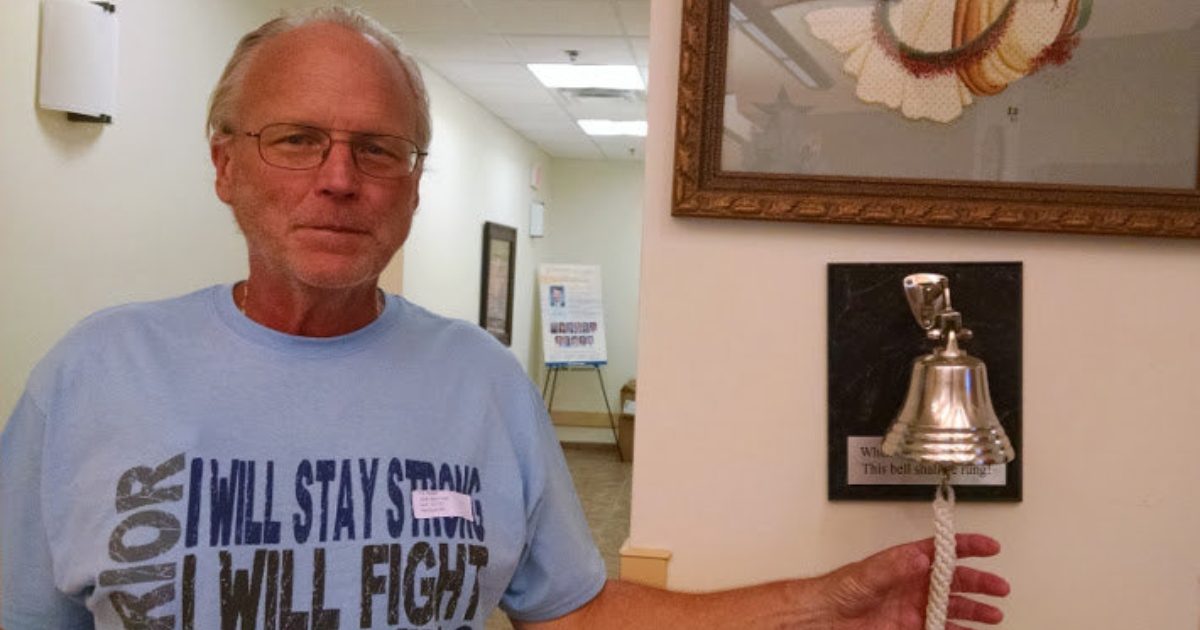Finding Support Through Cancer
- Robert Fry was 64 when he was diagnosed with colon cancer, and underwent surgery and chemotherapy to beat the disease.
- Fry witnessed an emotional moment during treatment, when nurses and doctors offered supportive help to a patient struggling.
- He turned the experience into his passion for helping others through their own cancer journeys.
- Fry now helps patients get to and from treatment, offering rides when they need them.
- During the rides, he offers his best encouragement to give them the strength they need.
Fry had been having symptoms he thought were attributable to irritable bowel syndrome a common disorder that affects the stomach and intestines and can cause symptoms like cramping, abdominal pain, bloating, gas, diarrhea and constipation. Because colon cancer can come with similar symptoms – like a change in bowel habits and abdominal pain – it’s no wonder Fry thought his symptoms were due to another condition.
Read MoreRELATED: Biomarkers in Colon Cancer: Understanding KRAS, BRAF, and HER2
"I'm not saying there were not days when I was tired, or inside I did not just feel right, but all-in-all, I was fortunate," he told the American Cancer Society. "I really believe it did not affect me in a negative way.
"I was not looking for self-pity, did not have the ‘Why me?’ attitude, or blame God or anybody. I always felt I was a positive person and I try to instill that energy in everyone I meet, especially people dealing with cancer."
Diet and Health: Foods that Might Prevent Colon Cancer
Feeling like he’d “just run a marathon,” Fry rang the bell signifying his final chemotherapy treatment extra hard in October 2016. He’s been healthy ever since, but his focus has shifted from his own recovery to that of others all because of a heartwarming moment he witnessed while undergoing chemo.
"A patient sitting next to me started having a negative reaction to the chemo he was receiving,” Fry explained. “The nurses responded quickly and the doctor also came to help. He talked softly to the man and held his arm in a passionate way and calmed him down.
“The man recovered and was able to continue his treatment. It was the most heartwarming thing I've ever experienced. It is this type of sincere, go-the-extra-mile, caring from the heart from this wonderful doctor that inspired me to do the same and get involved."
“Tell People What You Need” Dallas Cancer Survivor Terri Moore On The Value of a Support System
“Something switched inside [his] heart” that day, and Fry decided to volunteer with Road To Recovery an American Cancer Society program providing transportation to and from treatment for people with cancer who do not have a ride or are unable to drive themselves. So far, Fry has done almost 700 rides.
"When I drive patients to their treatments, I try to touch them in a way to give them strength to endure what they are going through,” he said. “They open up to me, I open up to them and together we give each other strength and support. I would like to think that in some way I have made it a little easier for them."
With newfound “faith, hope and love” in his life, Fry is confident he’s gained as much from the program as he’s given.
"When I transport these wonderful people, I truly feel blessed that I have been given the opportunity to do it,” he said.” Through volunteering in the Road To Recovery program with the American Cancer Society, I have the honor and pleasure of sharing my experience as well as listening to the patients I drive to treatment. These people are truly my heroes and the relationships we have built together are for a lifetime."
Know When to Screen for Colon Cancer
Robert Fry was 64 when he was diagnosed with colon cancer. He had been healthy all his life, and, like many people, decided to put off his colonoscopy. But, according to American Cancer Society recommendations, he should have began screening at age 45 if he was seemingly at an average risk of developing the cancer.
Myth Busting: Let's Talk About Colon Cancer Screening
Screening for colon cancer is crucial because, unlike with some other diseases, it can actually be prevented when the disease is caught in its earliest stages.
“[A colonoscopy] is still the only test that prevents and can diagnose colon cancer,” Dr. Zuri Murrell, colorectal surgeon at Cedars-Sinai Medical Center, told SurvivorNet. “I tell patients all the time, when I do their colonoscopy, we find a polyp, we take that polyp out, I say, ‘Congratulations, we prevented cancer.'”
If that isn’t reason enough, another one of our experts says screening has had a huge impact in lowering colorectal (colon and rectal) cancer cases in the United States.
"On a national level, colorectal cancer has been decreasing for the last 20 years," Dr. Heather Yeo, a surgical oncologist and colorectal surgeon at New York Presbyterian Weill Cornell Medical Center, said. "And much of that is thought to be directly due to screening for colon cancer."
Despite an overall decline in the number of cases, colorectal cancer is actually on the rise among younger people with "one in five new cases" now occurring in people in their early 50s or younger. This trend is actually what led the United States Preventive Services Task Force to update its colorectal cancer screening recommendations to begin at age 45 instead of 50.
Still, research suggests a tailored approach to screening could be most beneficial. So, talk with your doctor about your individual risk level in order to make a plan.
Learn more about SurvivorNet's rigorous medical review process.

